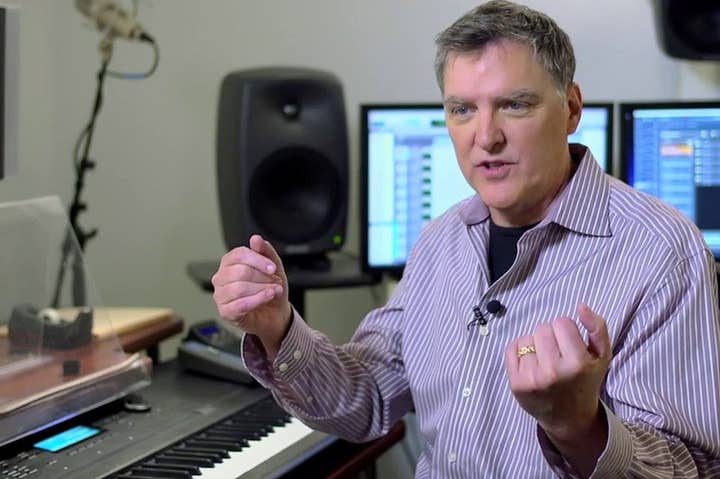Arbitrator settles in favour of Marty O'Donnell in Bungie case
Documents reveal extent of schism between composer and former colleagues
An independent arbitrator has settled in favour of Marty O'Donnell in his case against Bungie, the company he co-founded. The full documents, released alongside the ruling, are a catalogue of the growing grievances between O'Donnell, Bungie CEO Harold Ryan and Activision, with O'Donnell judging the publisher to have acted outside its remit in interfering in the creative process.
At the core of the disagreement was the matter of O'Donnell's shares. When Bungie fired O'Donnell in the spring of 2014, it forced him to give up the shares he'd held and rescind any future dividend from the extensive profit sharing agreement he'd established for Destiny. Sharon S Armstrong, the retired judge appointed as arbitrator in the case, has now ruled that this was illegal, with Bungie forced to reinstate "192,187.5 shares of vested Bungie common stock, the cash equivalent of 20 percent of his referred and common stock valued as of April 11, 2014, or the cash equivalent of 50 percent of his vested common stock valued as of July 2, 2014," reports Venture Beat.
But the full story is only apparent in the depths of the legal documents from the ruling, also published by Venture Beat's Dean Takahashi. In that record, the increasing isolation of O'Donnell by Ryan and Activision is very apparent, as is O'Donnell's building frustration.
Initially, the documents establish a few historical facts, such as O'Donnell's status as a founding member of Bungie, the stock he was awarded as such and the nature of Bungie's relationship to both Microsoft and Activision. THe nature and relevance of O'Donnell's work as composer for the music of Halo and Destiny is also clarified.
From the documents, it appears that the cracks in the relationship began to show when O'Donnell had completed The Music of the Spheres, his original soundtrack to Destiny. Proud of his work, O'Donnell wanted to release the soundtrack as a standalone album and became increasingly frustrated by what he saw as a lack of enthusiasm and co-operation by both Bungie and Activision to do so. To compound that frustration, Activision decided at the last moment, and apparently without the composer's consent, to replace extracts from Music of the Spheres in the 2013 E3 trailer for Destiny, using music sourced by Activision instead. Deeply unhappy with that decision, O'Donnell felt that the publisher had "overstepped its proper role by assuming artistic control of the trailer music."
At this time, O'Donnell had the backing of both Ryan and Bungie, which sent Activision a 'veto' letter regarding the matter, which Activision promptly overruled. In his anger, he tweeted at length about the origins of the music venting frustration. He also interrupted press briefings and "threatened" other Bungie employees in an attempt to prevent the trailer's publication online.
It was at this point that he seems to have lost the support of Ryan. Claiming that the involvement of Activision was hurting the "Band of Brothers" approach which he felt had been key to Bungie's success so far, O'Donnell became increasingly disruptive. Management concluded that his actions "hurt the Bungie team, hurt the game, drove a negative online discussion, and violated Ryan's instructions." It was also felt that O'Donnell was elevating his own interests above those of the company in his pursuit of the publication of Nusic if the Spheres. Activision, concerned by the negative press surrounding the behaviour, intimated that it could be in breach of the contract between it and Bungie. Ryan recommended that O'Donnell be fired.
However, after review, O'Donnell's employment continued, although a 2013 employment review considered hi behaviour to be unacceptable. O'Donnell took vacation, returning to record more voice over work, but no music. His colleagues and supervisor reported him to be disengaged and judged his performance to be unsatisfactory. Bungie began work on a Transition and Separation agreement for O'Donnell, to be presented at his next appraisal. That meeting occurred in March, 2014, with the agreement being presented as 'non-negotiable', essentially firing O'Donnell. Conditions of the agreement included finishing certain aspects of audio work within a timeframe that O'Donnell found impossible. In addition,O'Donnell would be paid some extra months salary, 20 per cent of his common and B-1 stock would be vested and he would be paid a performance bonus, but he would forfeit all other stock and profit options and would cease employment no later than July 31, 2014. Unhappy with the deal, O'Donnell refused.
Although he continued to work, O'Donnell's presence began to cause problems. Other members of the audio team judged him to be inhibiting progress and his contributions were wanting. Ryan recommended to the board that he be fired immediately. His contract was terminated without cause on April 11, 2014. All stock options were withdrawn at this point. In the months following, things became even more murky, with Bungie withholding vacation pay from O'Donnell unless he agreed to terms. O'Donnell also continued to distribute and perform Music of the Spheres without permission.
The arbitration has been rendered thusly: O'Donnell will receive 192,188 shares of common Bungie stock. He is also entitled to three years participation in the profit sharing plan, the payment for the first year of which amounts to $142,500. He will receive extra payments in 2016 and 2017. O'Donnell will surrender all future rights to Music of the Spheres and return all copies to Bungie. Each party bears its own costs and all other claims were dismissed.









